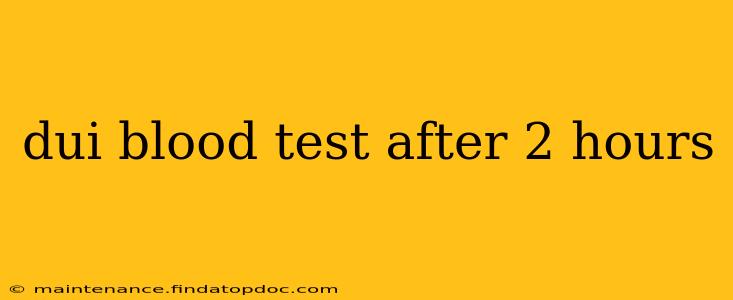A DUI (Driving Under the Influence) arrest often involves blood alcohol content (BAC) testing. Understanding how BAC changes over time is crucial for anyone facing these charges. This article will explore the implications of a blood test taken two hours after driving, addressing common questions and concerns.
What is a BAC Test and How Does it Work?
A BAC test measures the amount of alcohol in your bloodstream. Police officers can administer these tests using breathalyzers (breath tests) or blood tests. Blood tests are considered more accurate and are often used when there's a question about the reliability of a breathalyzer result or if there's a suspicion of other substances in the system. The results are expressed as a percentage—e.g., a BAC of 0.08% means there's 0.08 grams of alcohol per 100 milliliters of blood. Legal limits vary by jurisdiction, but 0.08% is a common threshold for legal intoxication in many places.
How Does Alcohol Metabolism Affect BAC Levels?
Alcohol metabolism varies from person to person due to factors like body weight, gender, metabolism rate, and the amount of food consumed before drinking. Your body begins processing alcohol immediately after consumption. However, the rate of metabolism is generally constant for a given individual. This means that after a certain amount of time, the BAC will generally decrease linearly. But, it's important to note that this is an average rate, and individual variations can be significant.
What Does a Blood Test After 2 Hours Show?
A blood alcohol concentration (BAC) test two hours after driving doesn't directly indicate your BAC at the time of driving. It provides a snapshot of your BAC at the time the sample was taken. To determine your BAC at the time of driving, forensic toxicologists and lawyers often employ extrapolation techniques, taking into account the individual's metabolism rate, amount of alcohol consumed, and time elapsed. This process is complex and relies on several assumptions, making it not always completely accurate. The two-hour delay introduces uncertainty, as alcohol continues to be metabolized during this time.
Can a blood test taken two hours after driving still show a BAC above the legal limit?
Absolutely. Depending on the amount consumed and the individual's metabolism, a BAC could still be above the legal limit two hours later. Many factors affect BAC levels including:
- Quantity of alcohol consumed: The more alcohol consumed, the higher the BAC and the longer it takes to metabolize.
- Time of consumption: The more recent the alcohol consumption, the higher the BAC will be at the two-hour mark.
- Body weight: Individuals with lower body weight tend to have higher BAC levels for the same amount of alcohol.
- Food consumption: Eating food before and during drinking can slow alcohol absorption and metabolism.
- Gender: Women generally have a lower tolerance for alcohol than men.
- Other medications: Some medications can interact with alcohol, affecting metabolism.
How is the BAC at the time of driving determined if the test is taken later?
To estimate the BAC at the time of driving, law enforcement and the courts will consider various factors. This might include witness testimony, the time of the alleged offense, the amount of alcohol the driver is estimated to have consumed, and the results of the blood alcohol test two hours later. An expert witness, often a forensic toxicologist, might be called upon to provide an opinion based on this data.
What are the legal implications of a high BAC two hours after driving?
A high BAC, even two hours after driving, significantly increases the likelihood of conviction for DUI. The prosecution will use the test results, along with other evidence, to build their case. A skilled DUI attorney can challenge the results by questioning the accuracy of the test, the chain of custody, and other aspects of the investigation.
Can I challenge the results of a blood test taken two hours after driving?
Yes, you can. A DUI case involves several legal complexities. Challenging the results often relies on demonstrating inconsistencies in the evidence collection process, questioning the accuracy of the test itself, or highlighting the uncertainties in extrapolating BAC levels back to the time of driving. Consulting with an experienced DUI lawyer is crucial to understand your rights and options.
This information is for educational purposes only and should not be considered legal advice. If you've been charged with a DUI, immediately consult with a qualified legal professional.
